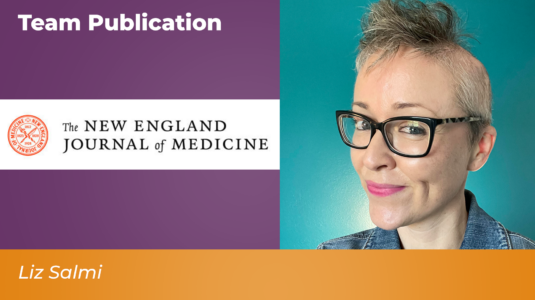OpenNotes advocate/researcher Liz Salmi describes a high-stakes decision she made in collaboration with her neurosurgeon during awake craniotomy.
Editorial / Commentary
Open notes in patient care: confining deceptive placebos to the past?
In some countries, the practice of “open notes” is advanced with patients using online portals to access their clinical records. In this report, the authors reflect on the consequences of access for placebo prescribing, particularly for the common practice of deceptive placebo use, in which patients are not aware they are being offered a placebo.
Shared access to patient portals for older adults: Implications for privacy and digital health equity
This viewpoint article discusses challenges and opportunities of systematic engagement of care partners through shared access to the patient portal that have been amplified in the context of the COVID-19 outbreak and recent implementation of federal information blocking rules to promote information transparency alongside broader shifts toward care delivery innovation and population aging. We describe implementation considerations and the promise of granular, role-based privacy controls in addressing the nuanced and dynamic nature of individual information sharing preferences and fostering person- and family-centered care delivery.
Sharing Clinical Notes Potential Medical-Legal Benefits and Risks
It is possible that greater mutual understanding and strengthened patient-physician communication could promote better health outcomes and reduce patients’ inclination to litigate even when medical errors do arise. Verifying the potential effects of sharing clinical notes on malpractice liability risks will require thorough study and monitoring.
The US opened up access to health records—how do patients use them?
Since April, the US has required healthcare providers to allow patients full access to their medical records—a milestone in a decades-long effort by a group of researchers and patients. Joanne Silberner examines the impact so far, and whether concerns have been borne out
Co-development of OurDX—an online tool to facilitate patient and family engagement in the diagnostic process
Patients and their care partners are usually the first to notice new or changing symptoms and are the connecting “thread” between different healthcare encounters. In this article Sigall Bell, Fabienne Bourgeois, Stephen Liu, and Eric Thomas—along with patient partners Betsy Lowe and Liz Salmi—describe the co-development of an online tool called “OurDX” (Our Diagnosis) to engage patients and families in the diagnostic process
We need to talk about “closed notes”
In this personal blog, the author discusses the harmful consequence of “closed notes” – of denying patients rapid access to their online clinical information. The blog post describes “closed notes” as an inherited structure in healthcare but urges that this does not make it right.
A step-by-step guide to peer review: a template for patients and novice reviewers
The peer review template for patients and novice reviewers is a series of steps designed to create a workflow for the main components of peer review. While relatively novel, patient peer review has the potential to change the healthcare publishing paradigm. It can do this by helping researchers enlarge the pool of people who are welcome to read, understand and participate in healthcare research. Academic journals who are early adopters of patient peer review have already committed to placing a priority on using person-centred language in publicly available abstracts and focusing on translational and practical research.
“Let’s Talk About Your Note”: Using Open Notes as an Acceptance and Commitment Therapy Based Intervention in Mental Health Care
Open notes are now the norm in mental health care in the U.S. Despite clinician concerns, early experiences suggest that patients and clinicians stand to benefit from embracing this change. Future studies should investigate using open notes as a clinical intervention while incorporating core processes of experiential therapies. ACT provides a framework for using open notes as a clinical tool in mental health care.
OpenNotes: Anticipatory Guidance and Ethical Considerations for Pediatric Psychologists in Interprofessional Settings
The OpenNotes era has ushered in the possibilities of greater patient and family collaboration in shared decision-making and reduced barriers to documentation sharing. However, it has raised new ethical and clinician documentation considerations. In addition to clinician education, patients and families could benefit from education around the purpose of clinical documentation, how to utilize OpenNotes, and the benefits of engaging in dialogue regarding the content and tone of documentation.





